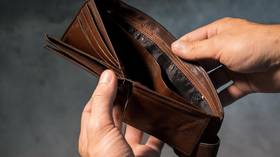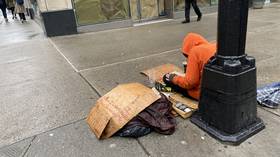US economy faces major recession – economists

The US economy is about to tumble into a recession, economic experts have forecast, dismissing more upbeat predictions from the Federal Reserve. Former Treasury Secretary Larry Summers warned on Sunday that the Fed’s inflation-related forecasts have been “much too optimistic” and insisted that it confront the recession staring it in the face.
“When inflation is as high as it is right now and unemployment is as low as it is right now, it’s almost always been followed, within two years, by recession,” Summers declared during a Sunday appearance on CNN, countering current Treasury Secretary Janet Yellen’s claim that “nothing….suggest[s] a recession is in the works.”
Summers pointed to “what’s happening in the stocks and bonds markets” and the recent rock-bottom consumer sentiment numbers as proof that “there’s certainly a risk of recession in the next year” and that “it’s more likely than not we’ll have a recession within the next two years.” Things could get even worse depending on the price of oil, he added, highlighting the “risk that it will rise higher.”
Gas prices are already at record highs in the US, recently surpassing an average of $5 per gallon – more than twice what they were when President Joe Biden entered the White House – and the Nasdaq and the S&P 500 stock indices recorded their worst week of the year earlier this month in the wake of an 8.6% rise in consumer prices, even higher than predicted.
Despite the sense of doom permeating markets, Yellen has insisted that consumer and investment spending are strong enough to avert a recession – even as she herself has admitted she was “wrong” about the galloping inflation that has characterized Biden’s presidency.
Federal Reserve Chair Jerome Powell has also struggled to downplay the difficulties facing the US central bank, though he has acknowledged that raising interest rates in an attempt to scupper inflation may cause “some pain” and kick up unemployment rates “a few ticks.” However, he does not appear to be convincing his peers.
“This is not landing a plane on a regular landing strip,” George Washington University economist Tara Sinclair pointed out. “This is landing a plane on a tightrope, and the winds are blowing. The idea that we are going to bring incomes down just enough and spending down just enough to bring prices back down to the Fed’s 2 percent target is unrealistic.”
Indeed, 70% of leading economists polled by the Financial Times on Sunday predicted a recession coming by the end of next year, and 40% of respondents think it will come before the end of the second quarter of 2023. Recessions are officially declared by the National Bureau of Economic Research, which defines one as “a significant decline in economic activity that is spread across the economy and lasts more than a few months.”
Most Americans already believe the US is in a recession, according to a poll conducted earlier this month. Fully 55% of those questioned, including 70% of Republicans and 43% of Democrats, believed the recession still being debated by economists has already arrived. Faced with the soaring price of staples such as food and gasoline, their opinions remain unswayed by the Biden administration’s insistence that the US is actually in recovery mode.
As the Fed hikes interest rates in an attempt to rein in inflation, the amount of debt shouldered by the average American will only increase, further stretching most families’ already-thin resources and piling on the economic pain. Few economic experts have presented alternatives to the solution of hiking interest rates, though there is debate over whether increasing them quickly or slowly will cause the least amount of suffering.













